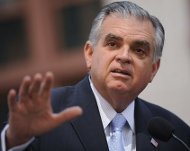Article from: www.thenewspaper.com/news/30/3020.asp
1/15/2010
US DOT Removes Results Measurement From Transit Funding Decisions
Transportation Secretary eliminates bang for buck requirement so that decisions can be made on a political basis.
 US Transportation Secretary Ray LaHood announced on Wednesday that he would re-write funding guidelines to dispense with rigid cost-benefit analysis when deciding which transit programs should receive funds. Under the previous system, because motorists provided the majority of the funding through the gas tax, money was allocated to cost-effective transit programs that promised the greatest overall reduction in traffic congestion. In remarks at the Transportation Research Board annual meeting, LaHood explained that the objective criteria will be replaced by a set of goals.
US Transportation Secretary Ray LaHood announced on Wednesday that he would re-write funding guidelines to dispense with rigid cost-benefit analysis when deciding which transit programs should receive funds. Under the previous system, because motorists provided the majority of the funding through the gas tax, money was allocated to cost-effective transit programs that promised the greatest overall reduction in traffic congestion. In remarks at the Transportation Research Board annual meeting, LaHood explained that the objective criteria will be replaced by a set of goals.
"Measuring only cost and how fast a project can move the most people the greatest distance simply misses the boat and... has slowed down transit expansion," LaHood reflected yesterday. "In 2010, a policy that has that effect is ridiculous."
One of the major hurdles in spending US motorist dollars on projects such as streetcars has been their extremely high cost and low usage rates. Fort Worth, Texas, for example, wants to spend $250 million on a streetcar project that is likely to serve between one and two percent of the population. With new flexibility to spend large sums to benefit a small constituency, LaHood will now be able to exert influence on electoral battleground states over the next few years.
"I'll make sure those investments in manufacturing help our most distressed communities in Illinois, Michigan, Ohio, Pennsylvania, and elsewhere," LaHood said.
The administration's move was heralded by Capitol Hill's most prominent advocate of streetcars and bicycles, Congressman Earl Blumenauer (D-Oregon).
"In line with President Obama's commitment to promoting livable communities, USDOT will drop a Bush-era practice that emphasized out-dated analyses focused primarily on travel-time savings for suburban commuters," a Blumenauer statement explained.
The Federal Transit Administration now take steps to codify new regulations to reflect the updated priorities. In his Wednesday speech, LaHood also emphasized the need to increase spending across the board on transportation projects to help the economy.
"Everywhere I go, the message is loud and clear," LaHood said. "They want the opportunity to leave their cars behind. To live near work and schools and good hospitals. And to enjoy clean, green neighborhoods. Our stimulus funds are helping many communities begin to realize those dreams.... But if we're really serious about creating livable, sustainable communities built around good transportation, then we must reform our current spending programs."
LaHood cited the spending of $8 billion in taxpayer dollars on a new passenger rail program, expanded support for Amtrak and another $1.5 billion in discretionary TIGER grants, which are designed to support efforts such as tolling, as evidence of the administration's willingness to spend on priority projects.
 US Transportation Secretary Ray LaHood announced on Wednesday that he would re-write funding guidelines to dispense with rigid cost-benefit analysis when deciding which transit programs should receive funds. Under the previous system, because motorists provided the majority of the funding through the gas tax, money was allocated to cost-effective transit programs that promised the greatest overall reduction in traffic congestion. In remarks at the Transportation Research Board annual meeting, LaHood explained that the objective criteria will be replaced by a set of goals.
US Transportation Secretary Ray LaHood announced on Wednesday that he would re-write funding guidelines to dispense with rigid cost-benefit analysis when deciding which transit programs should receive funds. Under the previous system, because motorists provided the majority of the funding through the gas tax, money was allocated to cost-effective transit programs that promised the greatest overall reduction in traffic congestion. In remarks at the Transportation Research Board annual meeting, LaHood explained that the objective criteria will be replaced by a set of goals.